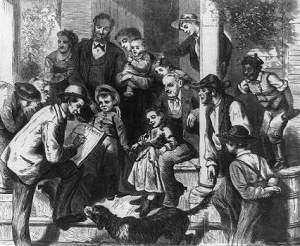Guest Blog by Aliya Saperstein*
A person’s race is as fixed as the color of his or her skin or the shape of his or her eyes – or so it seems. In fact, across American history, from the era of “octoroons” and “quadroons” and the days when the courts debated whether “Hindus” were white to recent arguments over what race or races Barack Obama should have checked on his census form, racial categories have not been so fixed. New research by our guest blogger (here, here, and here) shows that even a particular person’s race can shift from one time to another. What race we think someone is in part reflects the popular stereotypes we have about race and social difference.
Americans tend to think of race as a fixed characteristic defined by descent. During the early 20th century the “one-drop rule” crystallized legal segregation. Anyone with any known African ancestry was to be classified and treated simply as black. The rule applied even to people who appeared to be white, such as Walter White, a prominent early member of the NAACP.
The very fact that the United States tried so hard to impose such sharp distinctions suggests that race was not so much a biological or genetic characteristic but a socially constructed one. If racial differences were “natural,” how could the same person be considered blanca (white) in Brazil, or perhaps mestiza in Mexico, but black in the United States? How could the same person be described by the Census as “White” in 1910, “Hindu” in 1930, “Other” in 1960, and “Asian Indian” from 1980 on?
Nevertheless, most Americans still think a person’s race is fairly obvious and unchanging; we know it the minute we meet him or her. Similarly, most academic research also treats race as fixed and foreordained. A person’s race comes first and then his or her experiences, education, job, neighborhood, income, and well-being follow. My research with Andrew Penner on how survey respondents were classified by race over the course of their lives, calls into question this seemingly obvious “fact.”
A chicken and egg relationship
The National Longitudinal Survey of Youth has been following a group of about 12,000 Americans since they were teenagers and young adults in 1979. From 1979 to 1998, the survey interviewers had to identify the race of the people they interviewed, even when those people had been repeatedly interviewed. At the end of each session, interviewers recorded whether they thought a respondent was “Black,” “White,” or “Other.” Here is the surprise: nearly 20 percent of respondents experienced at least one change in their recorded race over those 19 years.
These changes were not random, as one might expect if the interviewers were just hurrying to finish up or if the data-entry clerks were making mistakes. The racial classifications changed systematically, in response to what had happened to the respondent since the previous interview.
All else being equal, including how they had been racially classified before, respondents who were unemployed, had children outside of marriage, or lived in the inner city were less likely to be classified as white and more likely to be classified as black. Having been incarcerated, unemployed, divorced, or impoverished each reduced the chances by a percentage point or two that someone who was recorded as white by an interviewer one year would be seen as white again the next year.
Seeing is believing
Although the changes in race that appeared to be caused by any given change in social position were small, all of the life outcomes we examined, including college graduation, teen parenthood and receiving welfare, affected changes in racial classification. Moreover, a cascade of woeful events could add up to a notable alteration in someone’s “race.” Take a hypothetical 29-year-old father of two who was classified as white by an interviewer. If he spent time before the next interview in jail, became unemployed, got divorced, and fell into poverty, his likelihood of being seen by an interviewer as white the next time dropped from 96 percent (random fluctuation, given no changes in his social position) to less than 85 percent. For positive experiences, the effects are in the opposite direction.
These changes line up in ways that reflect widespread racial stereotypes. Interviewers became likelier to see someone as black the more the respondents’ situations fit the stereotype of black people – and vice-versa for white people.
The studies we have conducted show that while race shapes our life experiences, our life experiences also shape our race. Race and perceptions of difference are not only a cause of inequality, they also result from inequality. Americans’ racial stereotypes have become self-fulfilling prophecies: the mental images Americans have of criminals and welfare queens, or college grads and suburbanites, can literally affect how we see each other.
————–
* Aliya Saperstein is Assistant Professor of Sociology at Stanford University, with a 2008 Ph.D. in Sociology and Demography from UC Berkeley. Her work focuses on how people come to perceive, name, and deploy “racial” differences, most recently examining the consequences of these processes for understanding class and health differences.
Update (6/7/16): Saperstein and Penner’s work with the NLSY survey has come under some statistical critique (see this blog post by Andrew Gelman for comment), but the debate continues. Saperstein will respond yet more fully later and discuss other surveys she has also used. Stay tuned.


